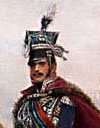In the end it was the instincts of Napoleon the soldier and opportunist that overcame the convictions of Napoleon the statesman. All his previous experience of war had taught him that victory could only be assured by the ruthless pursuit of a single aim, the hunting-down and destruction of the enemy's army. He felt confident that Alexander would be compelled to make a major effort to save Moscow, the religious focal point of his realm, and that a heavy defeat and the subsequent occupation of the Kremlin would inevitably bring him to his knees. It also seemed sound military policy to pursue relentlessly a foe already reeling back in considerable disarray, and who had indeed been doing so since the very opening of the campaign. Only in Moscow, therefore, could Napoleon hope to find peace. If for logistical reasons it was dangerous to linger at Smolensk, it was even more risky to head for Moscow, but only by such a bold course could there be any possibility of a reasonably rapid conclusion to the campaign. The historian Jomini put into Napoleon's mouth a summary of the case: "To force the Russians to a battle, and to dictate peace ... such was teh only mens of safety that now remained. Mar marshals were divided in opinion. Murat, who had first accused the Russians of pusillanimity, now trembled at the anger of penetrating so far into the interior. Others contended that we could hope for no repose till we had gained one decisive battle. I was also of this opinion. But how were we to obtain this battle? Certainly not by remaining at Smolensk, without provisions or other resources. There was no third choice -- we must march upon Moscow or retreat upon the Niemen ... The experiences of ten campaigns had taught me what was the most decisive point; and I did not doubt a blow struck at the heart of the Russian Empire would instantly destroy the accessory resistance of isolated corps." Accordingly the decision was taken. Napoleon communicated the outcome to a despairing Caulaincourt. "Before the month is out," he said, "we shall be in Moscow; in six weeks we shall have peace."
Napoleon the soldier and opportunist
~ D. Chandler, The Campaigns of Napoleon, p. 792-793























































No comments:
Post a Comment